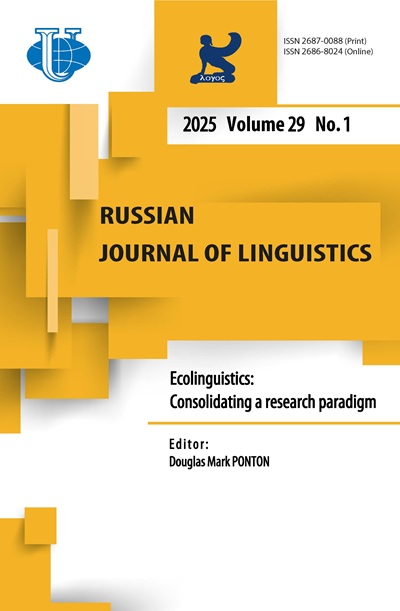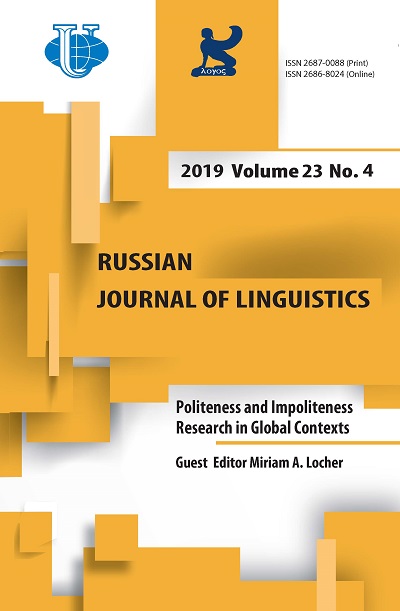Косвенность в эпоху глобализации: анализ сетевых связей
- Авторы: Теркурафи М.1
-
Учреждения:
- Центр лингвистики Лейденского университета
- Выпуск: Том 23, № 4 (2019): Исследование вежливости и невежливости в глобальном контексте
- Страницы: 930-949
- Раздел: Статьи
- URL: https://journals.rudn.ru/linguistics/article/view/22525
- DOI: https://doi.org/10.22363/2687-0088-2019-23-4-930-949
Цитировать
Полный текст
Аннотация
Косвенность традиционно рассматривается в связи с вежливостью и объясняется желанием говорящего избегать воздействия на адресата. Несмотря на эти теоретические предпосылки, в ряде исследований отмечаются функции косвенности, направленные на выражение солидарности и формирование идентичности. На основе анализа данных исследований был предложен расширенный взгляд на функции косвенности (Terkourafi 2014), в котором подчеркивается роль адресата и важность сетевых связей между собеседниками. В данной статье рассматривается вопрос о том, что происходит, когда в результате процессов урбанизации и глобализации сетевые связи между коммуникантами ослабевают. Опираясь на примеры из китайского языка и афроамериканского английского, автор утверждает, что эти процессы приводят к необходимости большей ясности в ущерб косвенности. Данное утверждение подтверждается также диахроническим анализом изменений в британско-английской вежливости, которые совпадают с усилением индивидуального Я. Полученные результаты имеют значение для теории вежливости в целом и подтверждают необходимость учета социально-исторического контекста при разработке теоретических положений.
Об авторах
Марина Теркурафи
Центр лингвистики Лейденского университета
Email: m.terkourafi@hum.leidenuniv.nl
профессор, заведующая кафедрой социолингвистики Лейденского университета, Нидерланды Van Wijkplaats 4, 2311 BX Leiden, The Netherlands
Список литературы
- Barker, Chris (2012). Cultural Studies: Theory and Practice. London: Sage.
- Bourdieu, Pierre (1990). The Logic of Practice. Transl. by R. Nice. Cambridge: Polity Press.
- Brown, Penelope & Stephen C. Levinson (1987). Politeness: Some Universals in Language Usage. Cambridge: Cambridge University Press.
- Dunbar, Robin (1992). Neocortex size as a constraint on group size in primates. Journal of Human Evolution, 22: 6, 469-493.
- Chen, Rong (1993). Responding to compliments: A contrastive study of politeness strategies between American English and Chinese. Journal of Pragmatics, 20: 49-75.
- Chen, Rong & Dafu Yang (2010) Responding to compliments in Chinese: Has it changed? Journal of Pragmatics, 42: 7, 1951-1963.
- Clark, Herbert H. (1986). Using Language. Cambridge: Cambridge University Press.
- Culpeper, Jonathan & Dawn Archer (2008). Requests and directness in Early Modern English trial proceedings and play-texts, 1640-1760. In A.H. Jucker, & I. Taavitsainen (eds.). Speech Acts in the History of English, pp. 45-84. Amsterdam: John Benjamins.
- Culpeper, Jonathan & Jane Demmen (2011). Nineteenth-century English politeness: Negative politeness, conventional indirect requests and the rise of the individual self. Journal of Historical Pragmatics, 12: 1-2, 49-81.
- Fagyal, Zsuzsanna, Samarth Swarup, Anna Maria Escobar, Les Gasser & Kiran Lakkaraju (2010). Centers and peripheries: network roles in language change. Lingua, 120: 8, 2061-2079.
- Fischer, Ron (2011). About chicken and eggs: Four methods for investigating culture-behaviour links. In Fons J.R. van de Vijver, Athanasios Chasiotis, & Seger M. Breugelmans (eds.). Fundamental questions in cross-cultural psychology (pp. 190-213). Cambridge, UK: Cambridge University Press.
- Goffman, Erving (1971). Relations in Public: Microstudies of the Public Order. New York: Basic Books.
- Grainger, Karen & Sara Mills (2016). Directness and Indirectness across Cultures. Basingstoke: Palgrave Macmillan.
- Grice, Herbert P. (1975). Logic and Conversation. In Peter Cole & Jerry L. Morgan (eds.). Syntax and Semantics, Vol. 3: Speech Acts, pp. 41-58. New York: Academic Press.
- Hall, Edward T. (1976). Beyond Culture. Garden City, NY: Anchor/Doubleday.
- Hall, Edward T. & Mildred Reed Hall (1990). Understanding Cultural Differences. Germans, French and Americans. Yarmouth, Maine: Intercultural Press.
- Hartley, Leslie P. (1953). The Go-Between. London: Hamish Hamilton.
- He, Yun (2012). Different generations, different face? A discursive approach to naturally occurring compliment responses in Chinese. Journal of Politeness Research, 8, 29-51.
- Hill, Beverly, Sachiko Ide, Shoko Ikuta, Akiko Kawasaki & Tsunao Ogino (1986). Universals of linguistic politeness: Quantitative evidence for Japanese and American English. Journal of Pragmatics, 10, 347-371.
- Ide, Sachiko (1989). Formal forms and discernment. Multilingua, 8, 223-248.
- Jucker, Andreas H. (2012). Positive and negative face as descriptive categories in the history of English. In: Marcel Bax & Daniel Z. Kádár (eds.). Understanding Historical (Im)Politeness: Relational Linguistic Practice Over Time and Across Cultures, pp. 175-194. Amsterdam: John Benjamins.
- Krugman, Paul & Robin Wells (2013). Macroeconomics. New York: Worth.
- Lakoff, Robin (1973). The logic of politeness; or, minding your P's and Q's. In: C. Corum, T. Cedric Smith-Stark & A. Weiser (eds.). Papers from the Ninth Regional Meeting of the Chicago Linguistics Society, pp. 292-305. Chicago: Department of Linguistics, University of Chicago.
- Lave, Jean & Etienne Wenger (1991). Situated Learning: Legitimate Peripheral Participation. Cambridge: Cambridge University Press.
- Leech, Geoffrey (1983). Principles of Pragmatics. London: Longman.
- Leech, Geoffrey (2014). The Pragmatics of Politeness. Oxford: Oxford University Press.
- Lin, Chih-Ying, Helen Woodfield & Wei Ren (2012). Compliments in Taiwan and Mainland Chinese: The influence of region and compliment topic. Journal of Pragmatics, 44: 11, 1486-1502.
- Milroy, Lesley (1987). Language and Social Networks. New York: Blackwell. Second edition.
- Morgan, Marcyliena (1991). Indirectness and interpretation in African-American women’s discourse. Pragmatics, 1: 4, 421-451.
- Morgan, Marcyliena (2010). The presentation of indirectness and power in everyday life. Journal of Pragmatics, 22: 2, 283-291.
- OED Online, Oxford University Press, September 2019, www.oed.com/view/Entry/272264. Accessed 7 November 2019
- Pew Research Center (2017). What it takes to truly be “one of us”: In U.S., Canada, Europe, Australia and Japan, publics say language matters more to national identity than birthplace. Retrieved from http://assets.pewresearch.org/wp-content/uploads/sites/2/2017/04/14094140/Pew-Research-Center-National-Identity-Report-FINAL-February-1-2017.pdf
- Pinker, Steven, Martin Nowak & James Lee (2008). The logic of indirect speech. Proceedings of the National Academy of Sciences, 105: 3, 833-838.
- Raviv, Limor, Antje Meyer & Shiri Lev-Ari (2019). Larger communities create more systematic languages. Proceedings of the Royal Society B: Biological sciences. 286, 1907, 1-9, 20191262.
- Scollon, Ron & Suzanne W. Scollon (1995). Intercultural Communication A Discourse Approach. Oxford: Blackwell.
- Sparke, Matthew (2013). Introducing Globalization: Ties, Tensions, and Uneven Integration. Oxford: Wiley-Blackwell.
- Tannen, Deborah (1981). Indirectness in discourse: Ethnicity as conversational style. Discourse Processes, 4: 3, 221-238.
- Terkourafi, Marina (2010a) (ed.). The Language(s) of Global Hip Hop. London: Continuum.
- Terkourafi, Marina (2010b). What is said from different points of view. Language and Linguistics Compass, 4: 8, 705-718.
- Terkourafi, Marina (2011). From Politeness1 to Politeness2: Tracking norms of im/politeness across time and space. Journal of Politeness Research, 7: 2, 159-185.
- Terkourafi, Marina (2014). The importance of being indirect: A new nomenclature for indirect speech. Belgian Journal of Linguistics, 28: 1, 45-70.
- Terkourafi, Marina (2019). Coming to grips with variation in sociocultural interpretations: methodological considerations. Journal of Cross-Cultural Psychology, 50: 10, 1198-1215.
- Wang, Yu-Fang & Pi-Hua Tsai (2003). An empirical study on compliments and compliment responses in Taiwan Mandarin conversation. Concentric: Studies in English Literature and Linguistics, 29: 2, 118-156.
- Xia, Dengshan, Yin, Caiyan & Chun Lan (2017). A study on compliment responses in triadic contexts. Foreign Language Teaching and Research (《外语教学与研究》), 49: 5, 688-698.
- Yuan, Yi. 2002. Compliments and compliment responses in Kunming Chinese. Pragmatics, 12: 2, 183-226.

















